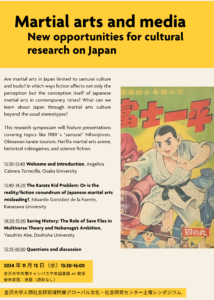NEWSニュース
[Nov.13]New opportunities for cultural research on Japan through martial arts and media マーシャルアーツとメディア:日本を見る文化研究の最前線
金沢大学人間社会研究域附属グローバル文化・社会研究センター主催シンポジウム

Flyer 1
New opportunities for cultural research on Japan through martial arts
and media
マーシャルアーツとメディア:日本を見る文化研究の最前線
2024年11月13日(水)13:30-16:00
金沢大学角間キャンパス中央図書館AV教室
使用言語:英語(通訳なし)
13:30-13:40 趣旨説明
13:40-14:20 Eduardo González de la
Fuente(金沢大学)「カラテ・キッド問題:日本のマーシャルアーツをめぐる現実とフィクションの曖昧さが誤解を招く?」
14:20-15:00
阿部康人(同志社大学)「歴史を保存(セーブ)する:マルチバース理論から『信長の野望』におけるセーブファイルの役割を考える」
15:15-15:35 Angelica Cabrera
Torrecilla(ディスカッサント、大阪大学)「日本のマーシャルアーツ研究に有効なポストモダンなスペキュレイティブ・フィクションとマルチバース理論」
15:35-16:00 質疑応答
【シンポジウム趣旨】
20世紀から、日本のマーシャルアーツ(柔道、剣道、空手などの武術)は国内でも海外でも、サムライや禅と結びつけられて理解され、近代的なスポーツとして実践されてきました。しかし、メディアやフィクションを通じて、マーシャルアーツのイメージがいかに形成されてきたかということについては、まだ研究は多くありません。日本のポピュラーカルチャーを通じて、マーシャルアーツがどのように認識され、愛好されてきたかを知るためには、とても重要な鍵となります。そこで本シンポジウムでは、理論とフィールドワークの両面から、1980年代のサムライ日本人論、沖縄の空手ツーリズム、ネットフリックスのマーシャルアーツ・アニメ、戦国物ビデオゲーム、SFといった多岐にわたる対象について、歴史学や文化人類学はもち
ろん、社会学、文化研究、メディア論、文学研究、コミュニケーション論などを学際的に総合し、新しい学術アプローチを試みます。
(研究発表要旨は下記の英語版をご参照ください。)
皆様のご来聴をお待ちしています!
Research Symposium: New opportunities for cultural research on Japan
through martial arts and media
Venue: Central Library, Kanazawa University, Kakuma Campus.
Date: Wednesday 13th November 2024.
Time: 13.30 pm – 16.00 pm
Conferences in English.
Since the very beginning of the 20th century, perceptions of martial
arts began to shape images of Japan both domestically and globally. Such
force, a prime instance of Japan’s soft power, has been fairly well
understood as emanating from the appeal of samurai and Zen (Benesch,
2020), together with the development of modern sporting practices
(Sánchez, 2018). The role of media and fiction in characterizing images
of Japan through martial arts, however, has been much less studied (Abe,
2011; Niehaus, 2018). This last mode of cultural circulation is key to
grasp much of the cognitive and affective reach of Japanese popular
culture abroad, and the ways it internationally underpinned meanings and
values associated to the country.
Are martial arts in Japan as a cultural formation limited to historical
samurai culture and budo? In which ways fiction affects not only the
perception but the conception itself of Japanese martial arts in
contemporary times? What can we learn about Japan through martial arts
culture beyond the usual stereotypes and platitudes?
This research symposium will expose theoretical approaches and case
studies, both fieldwork-based and text-based, to problematize and shed
light upon the above questions. The presentations will cover topics like
1980´s “samurai” Nihonjinron, Okinawan karate tourism, Netflix martial
arts anime, historical videogames, and science fiction.
The aim is to point new interdisciplinary directions by which the
cultural cluster Japan-martial arts is useful to consider topics and
issues in history and anthropology, but also sociology, cultural, media,
literary, and communication studies, thus supporting global and regional
research in these areas.
Schedule:
13:30-13:40 Angelica Cabrera Torrecilla, Osaka University: Welcome and
Introduction
13:40-14:20 Eduardo González de la Fuente, Kanazawa University: The
Karate Kid Problem: Or is the reality/fiction conundrum of Japanese
martial arts misleading?
This presentation explores the interrelationship between practice (dojo,
exhibitions, sport events) and non-mimetic representation (in art, film,
manga, anime, videogames) for the cultural history of martial arts in
Japan. The overall argument defends the constitutive nature of this
dialogical system, which in fact cements the “reality” of Japanese
martial arts in the popular mind. It also arises, nonetheless,
unconventionalities and inconsistences that more often than not fit with
difficulty in the official narratives about what martial arts are and
stand for. Far from concluding that those disjunctions between “facts”
and “inventions” give room to false knowledge, this presentation argues
that it is necessary to attend to fiction to get a clearer picture of
the scope and significance of martial arts as a medium for cultural
expression in and about Japan.
14:20-15:00 Yasuhito Abe, Doshisha University: Saving History: The Role
of Save Files in Multiverse Theory and Nobunaga’s Ambition
This presentation examines the Japanese historical simulation video game
Nobunaga’s Ambition: Sphere of Influence with Power-Up Kit through the
lens of the multiverse concept. Drawing on Graves’ theory of “emergent
narratives” and Juul’s notion of the “half-real,” the study explores the
game’s unique qualities as a medium and its depiction of historical
events. The analysis reveals that the ability to create multiple save
files plays a crucial role in generating parallel worlds within the
game. Additionally, the study highlights how the game’s portrayal of the
past influences our understanding of the real world
15:15-15:35 Angelica Cabrera Torrecilla, Osaka University: Discussion
Chair, Postmodern Speculative Fiction and the Multiverse Theory for
Japan-related and martial arts-related research
15:35-16:00 Questions and answers
Speakers’ bio notes:
Eduardo González de la Fuente is Associate Professor at the Centre for
the Study of Global Cultures and Societies at Kanazawa University in
Japan. Previously, he has held Postdoctoral positions at Cardiff
University, the Autonomous University of Barcelona, the University of
the Ryukyus, the National Autonomous University of Mexico and El Colegio
de Mexico. A sociologist of culture, he specializes in Japan-related
studies, with a specific focus on popular culture, media and martial
arts. He also investigates the cultural circulation between Japan-Spain
and Japan-Mexico. His most recent publications include book chapters for
UH Press, Brill and Routledge.
Yasuhito Abe is an Associate Professor in the Department of Media,
Journalism, and Communications at Doshisha University, Japan. His
research focuses on media, science communication, and popular culture.
Abe has published widely in leading academic journals such as the
International Journal of Communication, International Journal of
Cultural Studies, Communication & Sport, Citizen Science: Theory and
Practice, and the Journal of Science Communication, among others. He
received his Ph.D. in Communication from the University of Southern
California.
Angelica Cabrera Torrecilla is an invited researcher at the Graduate
School of Humanities of Osaka University and a member of the National
System of Researchers of Mexico. Her research focuses on
interdisciplinary approaches to time and space in culture, involving the
study of scientific phenomena, the multiverse, techno-digital contexts,
material/visual culture, fictional narratives, and East-West cultural
encounters. She has written extensively on the above topics, and acted
as the leading editor of The Multiverse as Theory in Postmodern
Speculative Fictional Narratives published by Routledge in 2024.
